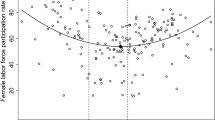Abstract
This paper proposes an analytical distinction between modes of valorising and modes of valuing social reproduction to suggest that a conflict between these two opposing modes lies at the heart of an on-going crisis of social reproduction in the face of purported economic recovery, where unpaid reproductive labour constitutes a source of surplus value. A systemic imperative to expand markets in the pursuit of profitability goes hand in hand with a devaluation of social reproduction, either by making this work invisible or by externalising its cost. This article analyses the specificities of this process in the context of contemporary Britain and investigates the role of the state, focusing on volunteering and new forms of ‘affective remuneration’ linked to financialisation and the connection between social reproduction and wealth extraction. In conclusion, the paper outlines the contours of possible counter-practices informed by a feminist politics.
Similar content being viewed by others
References
Alessandrini, D. (2014) Research note: Re-thinking feminist engagements with the state and wage labour. feminsts@law 4(1): 1–15.
Allon, F. (2014) The feminisation of finance. Australian Feminist Studies 29(79): 12–30.
Aspers, P. and Becker, J. (2011) The Worth of Goods – Valuation and Pricing in the Economy. Oxford: Oxford University Press.
Bakker, I. (2007) Social reproduction and the constitution of a gendered political economy. New Political Economy 12(4): 541–556.
Bassel, L. and Emejulu, A. (2015) Representations of minority women in contexts of austerity. Gender & Politics 10(1): 131–136.
Berg, H. (2014) An honest day’s wage for a dishonest day’s work: (Re)Productivism and refusal. Women’s Studies Quarterly 42(1–2): 161–177.
Borromeo, L. (2015) These Anti-homeless Spikes Are Brutal, We Need to Get Rid of Them, Comment is Free, The Guardian, July 24th 2015, http://www.theguardian.com/commentisfree/2015/jul/23/anti-homeless-spikes-inhumane-defensive-architecture [last accessed July 2015].
Bryan, D., Martin, R. and Rafferty, M. (2009) Financialization and marx: Giving labor and capital a financial makeover. Review of Radical Political Economics 41(4): 458–472.
Bryan, D. and Rafferty, M. (2014) Financial derivatives as social policy beyond crisis. Sociology 48(5): 887–903.
Caffentzis, G. (1999) On the notion of a crisis of social reproduction – A theoretical review’. In: M. Dalla Costa and G. Dalla Costa (eds.) Women, Development and Labor of Reproduction. Trenton, NJ: Africa World Press Inc.
Caffentzis, G. and Federici, S. (2014) Commons against and beyond capitalism. Community Development Journal 49(1): 92–105.
Cleaver, H. (1979) Reading Capital Politically. Austin: University of Texas Press.
Cox, N. and Federici, S. (1975) Counterplanning from the kitchen sink. Bristol: Falling Wall Press.
Colau, A. and Alemany, A. (2014) Mortgaged Lives – From the Housing Bubble to the Right to Housing. Journal of Aesthetic & Protest Press.
Clough, P. (2007) The Affective Turn – Theorising the Social. Durham, NC: Duke University Press.
Dalla Costa, M. (1972) Women and the subversion of community. In: M. Dalla Costa and S. James (eds.) The Power of Women and the Subversion of Community. Bristol: Falling Wall Press.
De Angelis, M. (2007) The Beginning of History – Value Struggles and Global Capitalism. London: Pluto Press.
Dean, J. (2015) Volunteering, the market, and neoliberalism. People, Place and Policy 9/2: 139–148.
Dowling, E. and Harvie, D. (2014) Harnessing the social: State, crisis and (big) society. Sociology 48(5): 869–886.
Elson, D. (1998) Integrating gender issues into National budgetary policies and procedures: some policy options. Journal of International Development 10(7): 929–941.
Esping-Andersen (1990) The Three Worlds of Welfare Capitalism. Boston MA: Harvard University Press.
Federici, S. (1975) Wages Against Housework. London: Power of Women Collective & Bristol: Falling Wall Press.
Federici, S. (2012) Revolution At Point Zero – Housework, Reproduction and Feminist Struggle. New York: Brooklyn, NY: Common Notions/Oakland, CA: PM Press.
Federici, S. (2014) From commoning to debt: Financialization, microcredit, and the changing architecture of capital accumulation. South Atlantic Quarterly 113(2): 231–244.
Feher, M. (2009) Self-appreciation; or, the aspirations of human capital. Public Culture 21(1): 21–42.
Fortunati, L. (1981/1995) The Arcane of Reproduction – Housework, Prostitution, Labor and Capital. Brooklyn, NY: Autonomedia.
Fortunati, L. (2007) Immaterial labour and its machinization. Ephemera: Theory & Politics in Organisation 7(1): 139–157.
Fraser, N. and Gordon, L. (1994) A genealogy of “dependency”: Tracing a keyword of the US welfare state. Signs: Journal of Women in Culture and Society 19(2): 309–336.
Fraser, N. (2014) Behind Marx’s hidden abode – For an expanded conception of capitalism. New Left Review 86: 55–72.
Gibson-Graham, J.K. (2006): A Postcapitalist Politics, Minneapolis, MN: University of Minnesota Press.
Haiven, M. (2014) Crisis of Imagination – Crisis of Power. London: Zed Books.
Harvey, D. (2004) The New Imperialism – Accumulation By Dispossession. Socialist Register 40: 63–87.
Haldane, A. (2014) In Giving, How Much Do We Receive? The Social Value of Volunteering, A Pro Bono Economics lecture to the Society of Business Economists, London, 9 September 2014, The Bank of England. [archive: www.bankofengland.co.uk/publications/Pages/speeches/default.aspx].
Hoskyns, C. and Rai, S.M. (2007): Recasting the global political economy: Counting women’s unpaid work New Political Economy 12(3): 297–317.
James, S. (2013) Sex, Race and Class-the Perspective of Winning: A Selection of Writings 1952–2011. Oakland, CA: PM Press [common notions].
Konings, M. (2015) The Emotional Logic of Capitalism. Redwood, CA: Stanford University Press.
Lordon, F. (2013) Willing Slaves of Capital. London: Verso.
Massey, D. (2014) Vocabularies of the Economy, in Hall, S., Massey, D. and Rustin, M. (eds.): After Neoliberalism – the Kilburn Manifesto. London: Lawrence and Wishart.
Markantonatou, M. (2013) From the limits to growth to “Degrowth”: Discourses of critique of growth in the crises of the 1970s and 2008, Working Paper, DFG Research Group on Postgrowth Socieites, Nr.05/2013, Jena. http://www.kolleg-postwachstum.de/sozwgmedia/dokumente/WorkingPaper/wp5_2013.pdf [last accessed Junw 2016].
Marx. K. (1887) Capital: Critique of Political Economy Vol. 1. London: Lawrence and Wishart.
Mason, P. (2015) Postcapitalism – A Guide To Our Future. London: Penguin.
Mezzadra, S. and Neilson, B. (2013) Border as Method – Or the Multiplication of Labour. Durham, NC: Duke University Press.
Mies, M. (1986) Patriarchy and Accumulation On A World Scale. London: Palgrave Macmillan.
Moore, J.W. (2014) The end of cheap nature, or: How i learned to stop worrying about ‘the’ environment and love the crisis of capitalism. In: C. Suter and C. Chase-Dunn (eds.) Structures of the World Political Economy and the Future of Global Conflict and Cooperation. Berlin: LIT, 285–314.
Morel, N., Palier, B. and Palme, J. (2012) Towards a Social Investment Welfare State? Ideas, Policies, Challenges. Bristol: Policy Press.
Mostafanezhad, M. (2012) The geography of compassion in volunteer tourism, Tourism Geographies: An International Journal of Tourism, Space, Place and the Environment 15(2): 318–337.
Negra, D. and Y. Tasker (eds.) (2014) Gendering the Recession – Media and Culture in an Age of Austerity. Durham NC: Duke University Press.
Oxfam (2013) The True Cost of Austerity and Inequality – UK Case Study. Oxfam Case Study September 2013, https://www.oxfam.org/sites/www.oxfam.org/files/cs-true-cost-austerity-inequality-uk-120913-en.pdf [last accessed December 2015].
Precarias a la Deriva (2006) A very careful strike – Four hypotheses. The Commoner 11: 33–45, http://www.commoner.org.uk/11deriva.pdf.
Pearson, R. and Elson, D. (2015) Transcending the impact of the financial crisis in the United Kingdom: Towards plan F—A feminist economic strategy. Feminist Review 109: 8–30.
Picchio, A. (1992) Social Reproduction: The Political Economy of the Labour Market. Cambridge: Cambridge University Press.
Pigeon, M., McDonald, D., Hoedeman, O. and Kishimito, S. (2012) Remunicipalisation – Putting Water Back Into Public Hands. Amsterdam: Transnational Institute.
Rai, S., Hoskyns, C. and Thomas, D. (2013) Depletion – the cost of social reproduction. International Feminist Journal of Politics 16(1): 86–105.
Read, J. (2016) The Politics of Transindividuality. Historical Materialism Book Series. Leiden: Brill.
Roberts, A. (2015) Gender, financial deepening and the production of embodied finance: Towards a critical feminist analysis. Global Society 29(1): 107–127.
Rosol, M. (2012) Community volunteering as neoliberal strategy? Green space production in Berlin. Antipode: A Journal of Radical Geography 44(1): 239–257.
Salamon, L., Sokolowski, S.W. and Haddock, M.A. (2011) Measuring the economic value of volunteer work globally: Concepts, estimates and a roadmap to the future. Annals of Public and Cooperative Economics 82(3): 217–252.
Sassen, S. (2014) Expulsions – Brutality and Complexity in the Global Economy. Cambridge, MA: Harvard University Press.
Social Finance (2015) What If We Ran It Ourselves? Getting the Measure of Britain’s Community Business Sector, (ed. by Andy Swerksy and James Plunkett). London: Social Finance UK, http://www.thepowertochange.org.uk/wp-content/uploads/2015/02/PtC-REPORT-FINAL-v1.2.pdf [last accessed December 2015].
Spinoza, B. (1677/2001) Ethics. Ware: Wordsworth Classics.
Steans, J. and Tepe, D. (2010) Social reproduction in international political economy: Theoretical insights and international, transnational and local sitings Review of International Political Economy 17(5): 807–815.
Streeck, W. (2014) Buying Time, London: Verso.
UK Cabinet Office (2015) Community Life Survey 2014-2015 Statistical Bulletin, https://www.gov.uk/government/collections/community-life-survey [last accessed December 2015].
Waring, M. (1988) If Women Counted – A New Feminist Economics. New York: Harper Collins.
Weeks, K. (2011) The Problem With Work – Feminism, Marxism, Antiwork Politics and Postwork Imaginaries. Durham, NC: Duke University Press.
Wetherell, M. (2015) Trends in the turn to affect – A social psychological critique. Body & Society 21(2): 139–166.
Whitfield, D. (2015) Alternative to Private Finance of the Welfare State: A global analysis of Social Impact Bond, Pay-for-Success & Development Impact Bond Projects, http://www.european-services-strategy.org.uk/publications/essu-research-reports/alternative-to-private-finance-of-the-welfare/alternative-to-private-finance-of-the-welfare-state.pdf [last accessed December 2015].
Williams, R. (1977) Marxism and Literature. Oxford: Oxford Paperbacks.
Winker, G. (2015) Care Revolution – Schritte in eine solidarische Gesellschaft. Bielefeld: Transcript Verlag.
Women’s Budget Group (2014) The Impact of Women of the Budget 2014: No Recovery For Women. London: Women’s Budget Group, http://www.wbg.org.uk/wp-content/uploads/2014/03/FINALWBG-2014-budget-response.pdf [last accessed December 2015].
Author information
Authors and Affiliations
Corresponding author
Rights and permissions
About this article
Cite this article
Dowling, E. Valorised but not valued? Affective remuneration, social reproduction and feminist politics beyond the crisis. Br Polit 11, 452–468 (2016). https://doi.org/10.1057/s41293-016-0036-2
Published:
Issue Date:
DOI: https://doi.org/10.1057/s41293-016-0036-2




